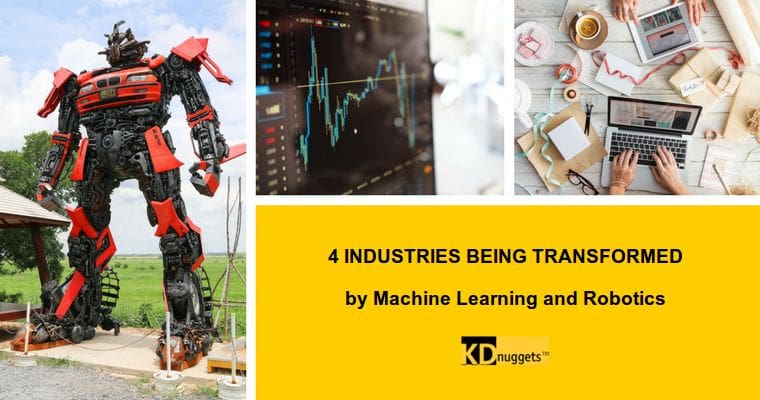 4 Industries Being Transformed by Machine Learning and Robotics
4 Industries Being Transformed by Machine Learning and Robotics
When used in combination with big data and machine learning, both AI and robotics can actively improve over time as they collect more information. You don’t have to look far to see how these technologies have revolutionized the world, and continue to do so.

Robotics, artificial intelligence, machine learning and big data platforms go hand-in-hand. Especially in modern society, it’s extremely common to find these technologies working together. Each has also improved and revolutionized the world in myriad ways.
Robotics, for example, altered productivity completely — especially in the manufacturing and assembly market. Machine learning and AI are contributing to automation systems, which can replace human workers entirely. When used in combination with big data and machine learning, both AI and robotics can actively improve over time as they collect more information.
You don’t have to look far to see how these technologies have revolutionized the world, and continue to do so. In fact, we’re going to take a look at a few industries that are currently being transformed by these technologies — in particular, machine learning, AI and robotics.
1. The Health Care Industry
The health care industry is being transformed almost entirely by these technologies, with the widespread use of each becoming more prevalent. Doctors are using robotics to conduct invasive surgeries under much safer and more efficient conditions.
AI and machine learning are helping physicians make more informed diagnoses of their patients, thanks to a much larger database of information.
Finally, automated systems haven’t seen the same amount of growth as the other technologies, but it’s still becoming more viable. This includes scanning hardware and systems to find ailments or unhealthy body zones, and robotics used to conduct surgeries. Some of the tools are designed to perform precise operations without the need for a human behind the controls because they are more accurate.
Surgeons have been slow to adopt the new technology powering automation and robotics, but the market is growing. The FDA granted approval to a few new systems over the past couple of years, which indicates an emergence of new technologies.
2. The Manufacturing Industry
Modern and industrial manufacturing was one of the first industries to make use of robots and automation systems, starting as far back as the 1960s. It stands to reason that the technology has grown considerably since then.
When they first appeared, robots were used to automate simple, tedious tasks humans would find boring or even dangerous. Many systems worked alongside humans and still required constant supervision to ensure they were operating effectively. Today, however, the robotics and automatic systems used in manufacturing are often more efficient than new or unskilled labor.
When used in combination with AI and machine learning platforms, the robotics can become much more advanced, and even intelligent. They also reduce costs significantly. For every 1,000 workers, a single robot can replace wages between a quarter and one-half percent.
3. The Finance Industry
It may be strange to imagine modern technologies taking hold in the finance market, especially when it comes to financial services and customer service. That said, in the near future, AI and machine learning will begin to take a significant root in the industry, all but replacing human advisors.
An AI system, for example, can take so much more data into account when providing financial recommendations. It can analyze social media posts, emails, messages and purchase history to offer personalized sentiment analysis on how to handle finances.
Over time, AI can also monitor your habits and finances and help with much more accurate decisions. More importantly, it can help many financial professionals build a strong portfolio. Other areas of interest include fraud detection and security, algorithmic trading, loan and insurance underwriting and more.
4. Retail and Customer Service
AI and machine learning are more to blame for advancements in the retail and consumer sectors. In marketing, especially, they can help analyze and predict customer behaviors to pinpoint viable promotions, advertisements and even product channels.
Of course, AI and machine learning are behind one of the biggest advancements in the industry, one which happens to be seeing immense growth right now: chatbots. Chatbots are a modern form of communication that offer 24/7 support to customers. They can reach out via one-to-one messaging platforms, and the bots can answer queries, handle personal account details, make recommendations and even chat like a real human being.
Some great examples of chatbots or AI platforms include Apple’s Siri and Amazon’s Alexa, but both of those platforms are designed specifically for use in a consumer’s home. You’ll encounter customer-service chatbots on a retail site with a chat service available.
More Advanced Technology Is on the Horizon
You’ll find some great examples and case studies listed here, but it’s important to remember they’re just a start.
AI, machine learning, modern robotics and automation systems will transform seemingly every industry in the near future — from retail and customer service to public transportation. The future is certainly bright.
Bio: Kayla Matthews discusses technology and big data on publications like The Week, The Data Center Journal and VentureBeat, and has been writing for more than five years. To read more posts from Kayla, subscribe to her blog Productivity Bytes.
Related:
- 6 Reasons Why Python Is Suddenly Super Popular
- The Real “Fear” of AI is Automation Inundation
- What Artificial Intelligence and Machine Learning Can Do—And What It Can’t

 4 Industries Being Transformed by Machine Learning and Robotics
4 Industries Being Transformed by Machine Learning and Robotics